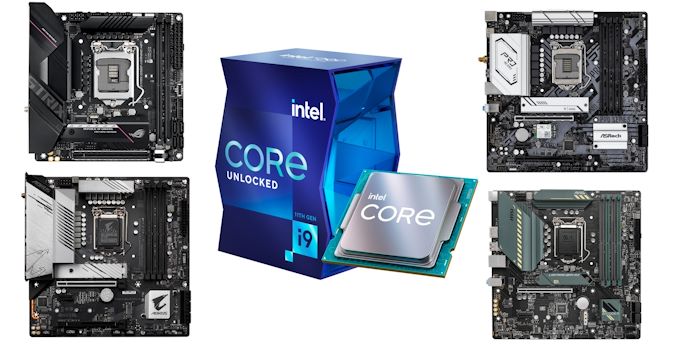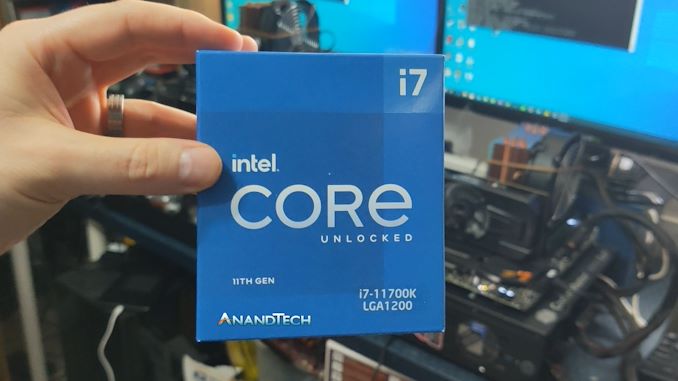Intel Rocket Lake (14nm) Review: Core i9-11900K, Core i7-11700K, and Core i5-11600K
by Dr. Ian Cutress on March 30, 2021 10:03 AM EST- Posted in
- CPUs
- Intel
- LGA1200
- 11th Gen
- Rocket Lake
- Z590
- B560
- Core i9-11900K
Conclusion
For anyone buying a new system today, the market is a little bleak. Anyone wanting a new GPU has to actively pay attention to stock levels, or drive to a local store for when a delivery arrives. The casual buyers then either look to pre-built systems (which are also flying off the shelves), or just hang on to what they have for another year.
But there is another way. I find that users fall in to two camps.
The first camp is the ‘upgrade everything at once’ attitude. These users sell their old systems and buy, mostly, all anew. Depending on budget and savings, this is probably a good/average system, and it means you get a good run of what’s available at that time. It’s a multi-year upgrade cycle where you might get something good for that generation, and hopefully everything is balanced.
The other camp is the ‘upgrade one piece at a time’. This means that if it’s time to upgrade a storage drive, or a memory kit, or a GPU, or a CPU, you get the best you can afford at that time. So you might end up with an older CPU but a top end GPU, good storage, good power supply, and then next time around, it’s all about CPU and motherboard upgrades. This attitude has the potential for more bottlenecks, but it means you often get the best of a generation, and each piece holds its resale value more.
In a time where we have limited GPUs available, I can very much see users going all out on the CPU/memory side of the equation, perhaps spending a bit extra on the CPU, while they wait for the graphics market to come back into play. After all, who really wants to pay $1300 for an RTX 3070 right now?
Performance and Analysis
In our Core i7-11700K review, our conclusions there are very much broadly applicable here. Intel’s Rocket Lake as a backported processor design has worked, but has critical issues with efficiency and peak power draw. Compared to the previous generation, clock-for-clock performance gains for math workloads are 16-22% or 6-18% for other workloads, however the loss of two cores really does restrict how much of a halo product it can be in light of what AMD is offering.
Rocket Lake makes good in offering PCIe 4.0, and enabling new features like Gear ratios for the memory controller, as well as pushing for more support for 2.5 gigabit Ethernet, however it becomes a tough sell. At the time we reviewed the Core i7-11700K, we didn’t know the pricing, and it was looking like AMD’s stock levels were pretty bad, subsequently making Intel the default choice. Since then, Intel's pricing hasn't turned out too bad for its performance compared to AMD (except for the Core i9), however AMD’s stock is a lot more bountiful.
For anyone looking at the financials for Intel, the new processor is 25% bigger than before, but not being sold for as big a margin as you might expect. In some discussions in the industry, it looks like retailers are getting roughly 20%/80% stock for Core i9 to Core i7, indicating that Intel is going to be very focused on that Core i7 market around $400-$450. In that space, AMD and Intel both have well-performing products, however AMD gets an overall small lead and is much more efficient.
However, with the GPU market being so terrible, users could jump an extra $100 and get 50% more AMD cores. When AMD is in stock, Intel’s Rocket Lake is more about the platform than the processor. If I said that that the Rocket Lake LGA1200 platform had no upgrade potential, for users buying in today, an obvious response might be that neither does AM4, and you’d be correct. However, for any user buying a Core i7-11700K on an LGA1200 today, compared to a Ryzen 7 5800X customer on AM4, the latter still has the opportunity to go to 16 cores if needed. Rocket Lake comes across with a lot of dead-ends in that regard, especially as the next generation is meant to be on a new socket, and with supposedly new memory.
Rocket Lake: Failed Experiment, or Good Attempt?
For Intel, Rocket Lake is a dual purpose design. On the one hand, it provides Intel with something to put into its desktop processor roadmap while the manufacturing side of the business is still getting sorted. On the other hand it gives Intel a good marker in the sand for what it means to backport a processor.
Rocket Lake, in the context of backporting, has been a ‘good attempt’ – good enough to at least launch into the market. It does offer performance gains in several key areas, and does bring AVX-512 to the consumer market, albeit at the expense of power. However in a lot of use cases that people are enabling today, which aren’t AVX-512 enabled, there’s more performance to be had with older processors, or the competition. Rocket Lake also gets you PCIe 4.0, however users might feel that is a small add-in when AMD has PCIe 4.0, lower power, and better general performance for the same price.
Intel’s future is going to be full of processor cores built for multiple process nodes. What makes Rocket Lake different is that when the core was designed for 10nm, it was solely designed for 10nm, and no thought was ever given to a 14nm version. The results in this review show that this sort of backporting doesn’t really work, not to the same level of die size, performance, and profit margin needed to move forward. It was a laudable experiment, but in the future, Intel will need to co-design with multiple process nodes in mind.












279 Comments
View All Comments
schujj07 - Wednesday, March 31, 2021 - link
Intel 10nm is not TSMC 7nm.watzupken - Wednesday, March 31, 2021 - link
"What the he'll is that supposed to mean that you can't you can't get the frequency at 10 nm and therefore you have to stick with the 14 nm node? That's pure nonsense, AND is at 7 nm and they are getting the target frequencies. Maybe stop spreading the Coolaid and call a spade a spade...."I am not sure how true this is, but the clockspeed for early versions of 10nm were abysmal. If you look at the first gen of 10nm chip from Intel, Cannon Lake, not just is clockspeed low, but specs is bad. Second gen 10nm, Ice Lake, and you see similar trend of very low clockspeed. I am using an i5 Ice Lake U that is advertised with a base clock of 1Ghz. It is only with 10nm Super Fin (third gen) where you start seeing higher clockspeed. Also, yield with early 10nm is certainly an issue, or they will not have to push out Rocket Lake @ 14nm, while laptops and servers/ workstations (only recently) are on 10nm. I suspect Intel is pushing their 10nm towards the same path as their current 14nm, feed it with more power and push clockspeed as high as possible. I will not be surprise that Alder Lake may bring better performance with a max of 8 big cores, but power consumption wise may only see marginal improvements at load. Light load may not expose the power inefficiency because of the small cores will pick up the load.
boozed - Tuesday, March 30, 2021 - link
There's some weirdness going on in at least one, possibly two of the FFXV 95th percentile graphswatzupken - Wednesday, March 31, 2021 - link
I feel I have to give Intel the credit of moving forward with a 14nm Rocket Lake, instead of hanging around like they did for the last 5 years with the same Skylake chip but boosted with steroids. But evidently, 14nm is becoming a burden to their progress. I know Intel supporters will claim that 14nm is capable of competing with 7nm. On the surface, yes. But at the cost of massive power draw and heat output with regression in performance as compared to the previous i9 in some cases. I would say that i5 would still be a chip worth considering, but not the i7 or i9 if you your main use case is gaming. At the respective price points, looking just at the price of an Intel i7 or i9 Rocket Lake chip appears to be cheap, but if you consider you need some hardcore motherboard and cooling to keep the chip chugging at the a high all core clockspeed, the cost actually skyrockets.Personally after looking at a number of reviews of Rocket Lake, it seems to me its a product that is too little and too late. Plus, if you are going for an i7 or i9, your upgrade path is dead since there will be no Rocket Lake with a higher core count. At least on the AMD camp, if you settled for a Ryzen 5 or 7, one may still have the option to scoop up a Ryzen 9 if prices come down with the introduction of Zen 4. In the absence of AMD chips at MSRP, I guess I will only recommend a Rocket Lake i5 because of the significant improvement over last gen. Otherwise, I don't think most will lose out much by going for the discounted Comet Lake chips.
Hifihedgehog - Wednesday, March 31, 2021 - link
LOL. Keep dreaming...https://i.imgflip.com/53vqce.jpg
529th - Wednesday, March 31, 2021 - link
No chipset fans for their PCIe 4.0?JMC2000 - Wednesday, March 31, 2021 - link
Intel 500-series chipsets don't have PCI-E 4.0, only the CPU does.https://ark.intel.com/content/www/us/en/ark/produc...
yeeeeman - Wednesday, March 31, 2021 - link
One of the few tech sites that remained professional and didn't use click baity titles or disrespect intel.Rocket is clearly a stop gap and a product that doesn't make sense, but it is what it is and as a professional tech writer you should treat it with decency not write insulting words and call it a poop like hardware unboxed did for example.
XabanakFanatik - Wednesday, March 31, 2021 - link
Ok PiednoelQasar - Wednesday, March 31, 2021 - link
go see how well gamers nexus liked this cpu.intel deserves ALL the flack they get for this cpu, its a joke, and a dud.